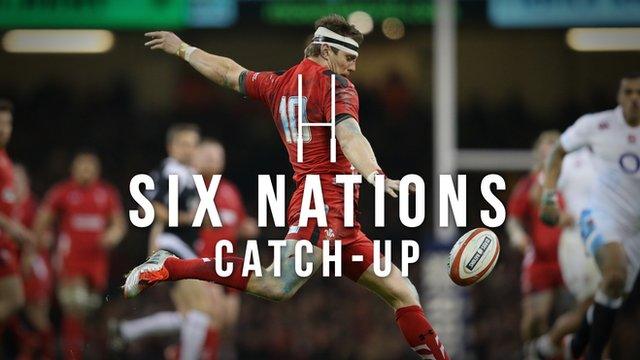Six Nations 2015: Nine ways to make rugby a safer sport
- Published
- comments

The ferocity of the confrontation was evident in the opening Wales-England Six Nations clash
Blood and thunder, guts and glory. The Six Nations has always been defined by physical confrontation, but this winter has seen the bodies piling up like seldom before.
George North, struck twice on the head, external with sickening force. His Wales team-mate Samson Lee concussed, the forehead of his fly-half Dan Biggar lacerated in another collision.
That was just the opening match. In the games since, Italy have lost two players to knee injuries, England their full-back Mike Brown to concussion,, external Ireland their number eight Jamie Heaslip, external to three damaged vertebrae and Scotland three players - Richie Gray, Gordon Reid and Jon Welsh - for the entire tournament.
Across the sport, from elite level to grassroots, it has focused minds on safety like never before.
How to protect both players and the game? How to cut the injury lists, extend careers and keep amateurs and kids in a sport that at its heart involves contact at speed?
We spoke to nine individuals representing every level of the sport in Britain, from elite coaches and former internationals to teachers, doctors, parents and club chairmen.
Their task? To come up with a single change that would help make rugby a safer sport.
Bring back old-style rucking
Jonathan Davies, ex-Wales fly-half & GB rugby league international:
"It's difficult to make rugby safer in some ways because it is a contact sport. But the clear-out at the ruck has become very dangerous, even if you sometimes have to do it because there'll be men over the ball.
"So I would bring back rucking in the professional game. Having been on the end of a rucking, you don't stay in the bottom of a ruck for very long, and you make sure you're not caught there again.
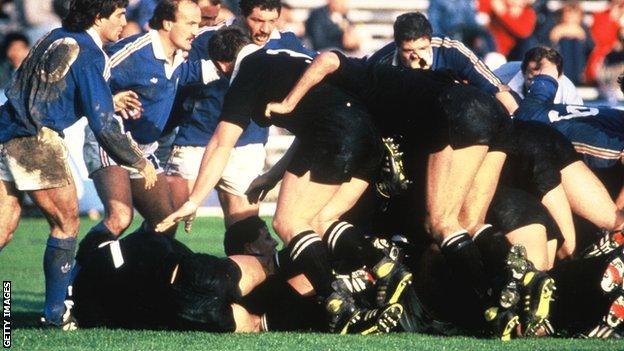
The All Blacks were renowned for rucking over the ball - here during the inaugural World Cup in 1987
"If you ruck above the shoulder or above the knee you would draw a yellow or red card. But if your hand is in there and it gets rucked - well, that's your fault. It is not a career-ending injury, which can come from the alternative.
"The game is physical and it is hard. But if it is refereed well it doesn't have to be too bad. You have to accept there will be danger. Players sometimes get their heads in the wrong position when they're tackling. Bring back rucking and you make the game safer and faster. With quick ball you have fewer big clear-outs and less 'jackaling'. And that will lead to fewer injuries.
Make head-guards compulsory for junior players
Jon Belshaw, parent of Solomon Belshaw, under-nines player for Colchester RFC & Littlegarth School:
"When Solly plays for his the club it's limited contact - one proper tackle, release the man after three seconds, a set of six tackles a side. At school it's full contact, with rucks, mauls and line-outs.
"Either way he is literally battered afterwards. He loves it, but we've also had no end of tears. We got him some body armour, and we haven't had a tear since. But we've also been to an under-nines tournament when two boys, in separate incidents, ended up with concussion, carried away in ambulances.
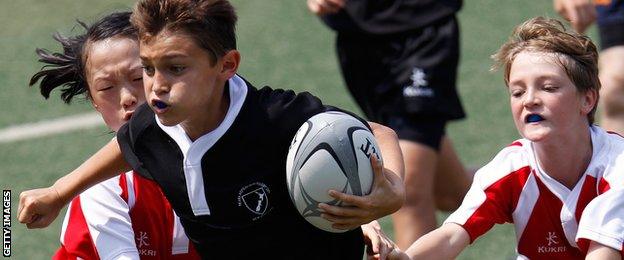
Junior players are not required to wear head-guards at present
"Helmets would reduce that. And although they can wear them at the moment, they don't like to as lots of their peers don't. It's seen as a badge of honour not to wear one. But they are hitting hard. Even at that age.
"When they play football they have to wear shin-pads, but when they play rugby, they don't have to wear anything at all. There is no protection for their soft tissues and heads.
"Having seen lads getting concussed aged eight, I think it is absolutely bananas that they're not forced to wear head-guards. It's like cycle helmets - no-one used to wear one, now all kids do. And if you go skiing, every kid will be wearing a helmet. Yet you go to rugby, and they can bash their heads into knees, coming out with bangs and cuts and bruises all over their heads. If you're playing professional sport and you don't want to wear one, that's your choice. But if you're a junior, you should be forced to."
Introduce 'exercise passports' for elite players
Dr James Robson, Scottish Rugby Union chief medical officer and six-time British & Irish Lions doctor:
"There are several big issues for me at the moment - challenging in the air, the emphasis on the big hit, first aid provision at grassroots level, the maximum height of a tackle, the clearing out of the guy over the ball at the breakdown.
"But if I had to make just one change it would be something I first mooted back in 1997: an exercise passport for each elite player, logging their time spent playing and giving them protected time off.
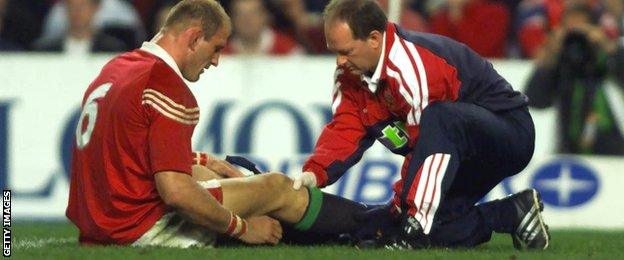
Robson (right) has been the doctor on the last six British & Irish Lions tours since 1993
"The northern hemisphere season is often too long. Add in a Lions trip or a summer tour and it can be almost continuous. Players imported from either hemisphere into other leagues can also end up playing all year round, all with the same result: guys not being given a sufficient break.
"It's like long-distance lorry drivers with their tachometers. We don't let them drive continuously, because we know it isn't safe. When my job meant me driving 28,000 miles a year rather than 16,000, my insurance company put up my premium for the same reason: the longer you are out there, the more likely you are to have an injury.
"The correlation between exposure and injury is not a simple one. You can play for one minute and get injured. You can play for 80 and be okay. But over the course of the season, we have to ask ourselves: are we giving these guys an adequate break?"
Take a two-week break after the Six Nations
Matt Dawson, former England scrum-half and World Cup winner:
"The RFU's last injury audit , externalshowed that the long-term injury count is considerably higher than it used to be. I know for a fact that a lot of that comes from playing when you're not quite right, and as a result picking up torn hamstrings or blown knees.
"International rugby is now incredibly intense. So too are training sessions. Even if you're a player who is training with an international squad but not making the match-day selection, you're often released back to your club side to play. Then there's the mental stress - getting pumped up for games, all that adrenaline and stress hormone. It's relentless, week after week.
Six Nations casualty list | After Round Two |
|---|---|
England | Mike Brown - concussion v Italy, misses Ireland game |
France | Alexandre Menini - foot injury v Scotland; missed Ireland match |
Ireland | Jamie Heaslip - damaged veterbrae - misses England game |
Italy | Alessandro Zanni - knee injury v Ireland - missed England game; Michele Campagnaro - knee injury - set to miss rest of Six Nations |
Scotland | Tommy Seymour - hip injury v France, missed Wales game; Richie Gray - damaged arm tendon v Wales; misses rest of Six Nations; Gordon Reid - concussion & strained knee ligament v Wales, out for rest of Six Nations; Jon Welsh - fractured hand v Wales, out of rest of Six Nations |
Wales | George North - two blows to head v England, rested v Scotland; Samson Lee - concussion v England; missed Scotland game; |
"Players don't like to be seen resting. It can also be frowned upon if you're not in the stands supporting the rest of the team. So the rest periods should be enforced, taking it out of the players' hands, and also away from the club. You can have a training programme, but get away from that environment.
"Players would be less injury prone and, come summer tours, they would be far sharper. If you're concerned about a lack of rugby, take that round of Premiership matches currently played on international weekends and have them at the end of the Six Nations. Rugby doesn't have to stop, but the players have to rest."
Increase medical resources in women's game
Maggie Alphonsi, World Cup winner and 71 caps for England:
"Rugby is such a different sport at the different levels, and so are the injuries players suffer.
"For junior rugby I would develop their physical strength and fitness so they suffer fewer repetitive injuries - it's that rather than the massive hit that's the issue there. For elite men it's more recognising symptoms; concussion isn't more prevalent, but we're learning how to deal with it.
"There will always be injuries in rugby. What you love about the sport is people putting their bodies on the line. But in the women's game a greater depth and availability of medical resources would make a significant difference.
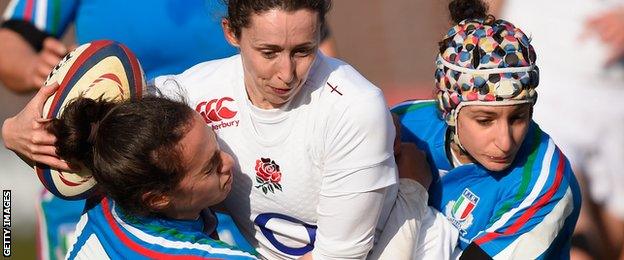
England beat Italy in their last Six Nations match after an opening defeat by Wales
"At the elite level there have been vast improvements. Lower down the structure there is so much more that could be done - recognising when injuries are being picked up, the expertise to rehab them back to full fitness, sufficient physios to ensure that everyone is seen and treated.
"The more fit players there are, the less of a burden on the injured ones. Because of the demands on players - internationals, club games, training sessions - you can feel as if you're never actually fully healthy. We should never have a situation where an injured player feels compelled to turn out for their club side because they're short of numbers."
Have defined rest period for elite players
Conor O'Shea, Harlequins director of rugby and ex-Ireland international:
"The World Cup this year has given us, inadvertently, the most wonderful opportunity to work out how to go forward. Why? The Premiership season will end in May and not start again until 17 October, so for the first time players not involved for their countries will have a proper break.
"We have to look after the players, because the game is only going one way - more physical and more intense. Something has to give.
"We used to play more in the recent past. I remember in 1997 playing for Ireland on the Saturday and sitting on the bench for London Irish on the Sunday. That wouldn't happen now, but the sport is so much more intense - the mental side of it too, the highs and lows of winning and losing.
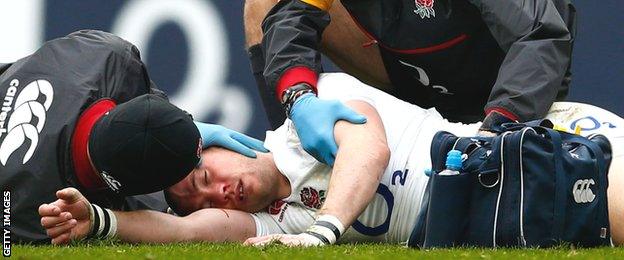
One of O'Shea's Harlequins players, Mike Brown, was concussed playing for England against Italy
"In American football the amount of playing, training and the level of intensity in training are so well defined. The season is short, the pre-season is long. I think we'll go down the same path.
"I know it's complicated. I know there are commercial imperatives and issues with the global season. But whatever way it works, we have to allow the players sufficient rest.
"Allow them to recover from the bangs and bruises. Give them time for a decent conditioning phase. Get them off this treadmill."
Enforce the offside law correctly
Jo Hammonds, Chairman of Stroud RFC:
"There's a very distinct difference between the pro and amateur game. For us there is still a position for players of every size and shape. You don't have to be 6ft 1in and 15 stone if you have the skills and speed.
"From the coaching point of view, at junior levels there is too much emphasis on the contact area. We play local sides who are only interested in putting the big hit in, not in evasion skills. In RFU coaching courses rugby is called an evasion game, and I think we've missed that point somewhere down the years.
"At senior level, I wonder how many referees are looking at the tackle area properly. We've seen more straight-arm tackles coming in from rugby league, the chop tackle as players come up fast to the line. I suspect a lot aren't technically legal tackles.
"Most injuries tend to happen when a defender comes up off a short line and bangs into his man. Tackling a guy going past you creates less of a collision. So I would ask for the offside law to be refereed properly - keeping defenders behind the back foot, stopping them going early or creeping up.
"We try to teach our kids that rugby is about evasion skills, a game for running with the ball. Make defences less dominant. Reward the attack. Reduce the chances of two big guys colliding."
Restrict length of the schoolboy season
John Mallett, director of rugby at Millfield School, alma mater of England captain Chris Robshaw:
"The issues at schoolboy level are very different to those in the pro game. The scrum at our level is much safer and much better controlled; we don't have the impact collision-type injuries.
"What would make a big difference for us is cutting the length of the season to allow kids to play other sports.
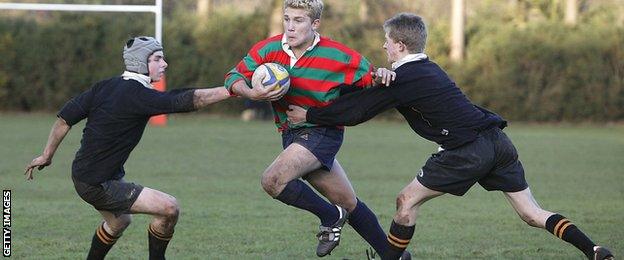
Ex-Millfield pupil Rory Hamilton-Brown, here (centre) in an Under-15s match, is now a county cricketer
"You want kids to have a good all-round athletic development. It improves their conditioning to play rugby, it keeps them mentally fresh, it keeps them playing for the thrill of simply playing.
"It's a concern for us as a school that we get 12-year-olds coming to us and all they do is play that one sport. It can be difficult when a kid is ambitious or part of a program, or if their parents are thinking this is what they need to do to be successful. There is a danger too of kids playing rugby all year round - a normal season, a tour tacked on.
"AB de Villiers is a great example to both kids and those who run sport of the advantages of not specialising too early. Play different sports. You will reduce the injury rate and increase your skill level."
Ensure a 12-week off-season for pro players
Damian Hopley, chief executive of the Rugby Players' Association:
"That should almost be a given. At micro level a lot of our thinking reverts to downtime between individual fixtures - for example, a minimum of six days between pro fixtures. At macro level the whole season structure needs to be looked at.
Day: Players have faith in doctors
"The management of centrally contracted players in other countries is very joined up between club and country. The issue in England is that the structure of our season puts polar demands on players; Stuart Lancaster wants his best peaking for the autumn internationals, the Six Nations and the World Cup; the Premiership coaches want them peaking in between.
"We need to find a balance where our top players get sufficient rest so that they can play 30 games a year. The British & Irish Lions is the most fantastic thing, but it is also the most intense seven-week tour and means that some players will be playing more than 40 games that season.
"You want players to have long and successful careers. The concern is that if you keep bashing away it will impact on that. In the NFL they have a limit of one contact training session a week. The demands on our players need to be recalibrated."
- Published26 February 2015
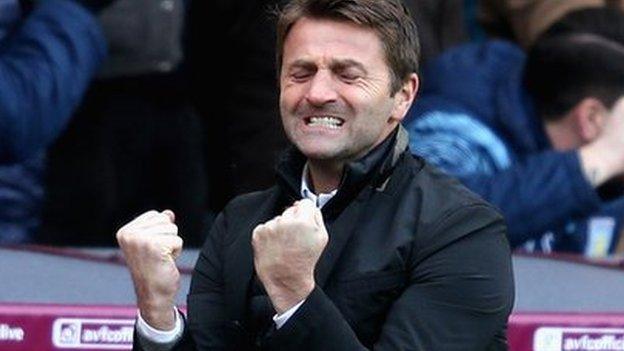
- Published25 February 2015

- Published26 February 2015
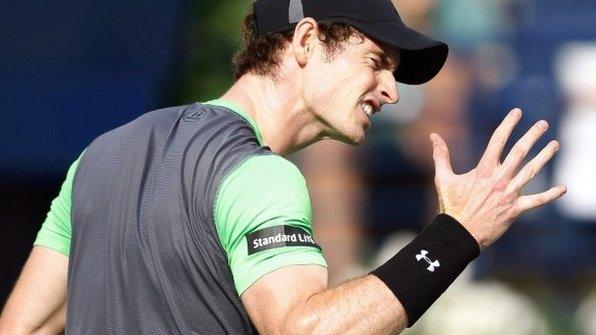
- Published26 February 2015
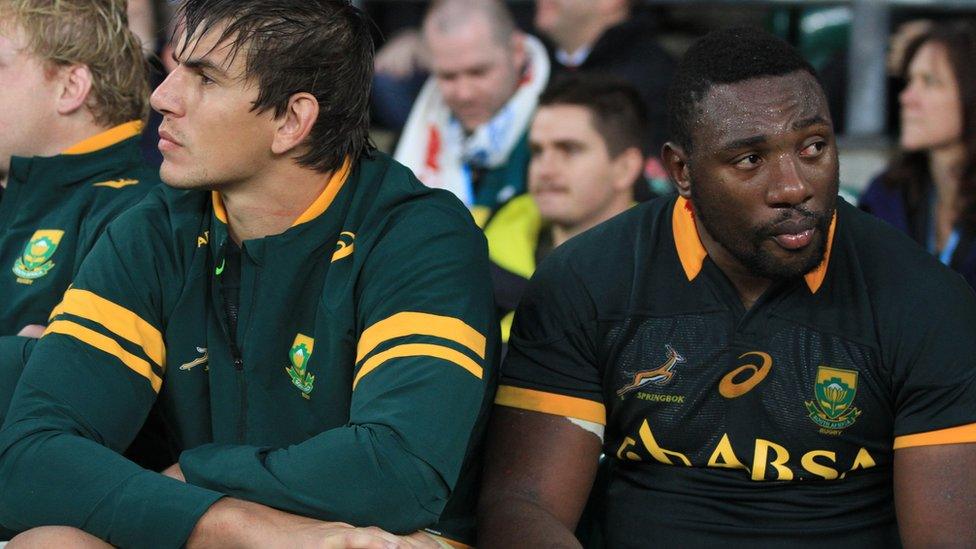
- Published15 February 2015
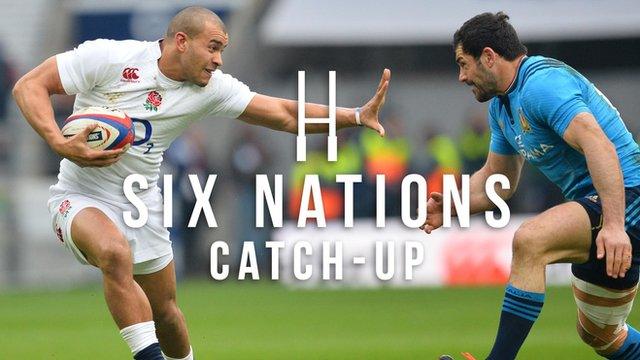
- Published26 February 2015
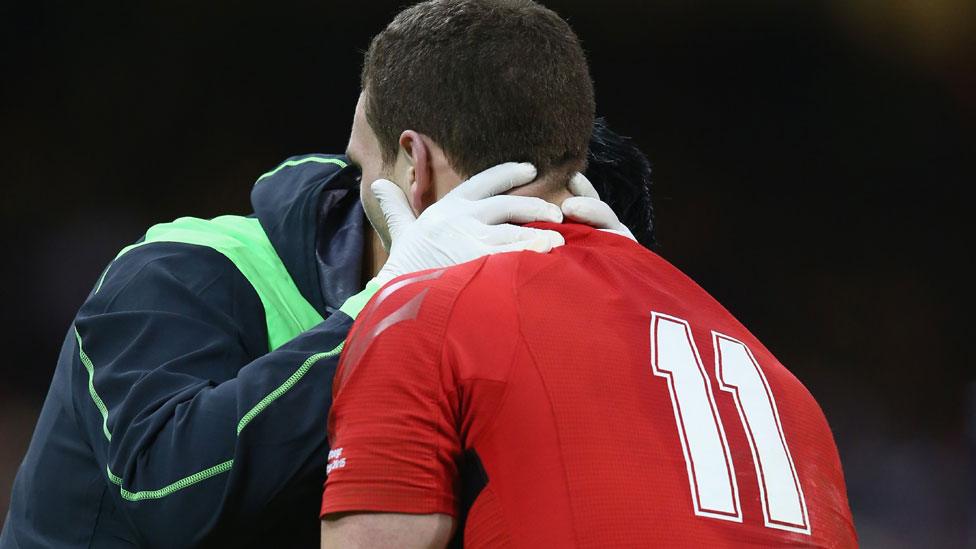
- Published10 February 2014
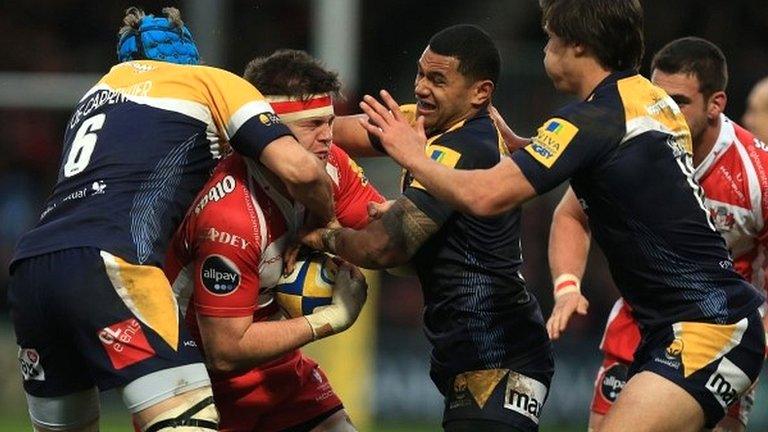
- Published14 February 2015
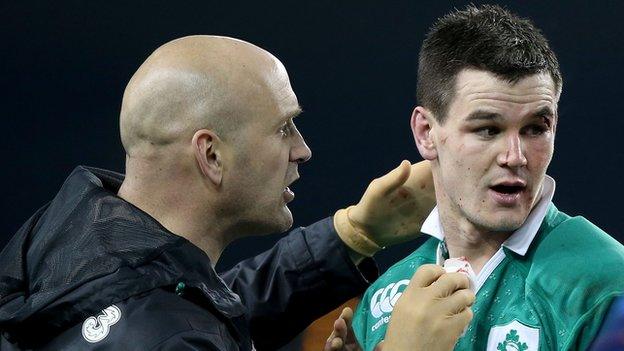
- Published8 February 2015
